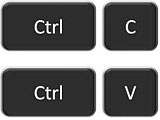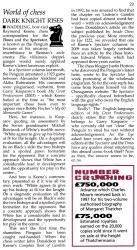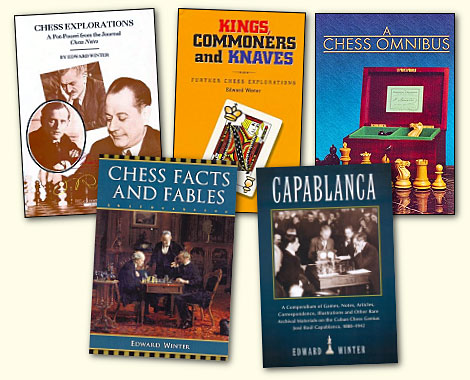


Below is the full text of an item posted as C.N. 8151 under the heading ‘Uncomfortable questions’:
Grandmaster A turns up at the board in an apparent drunken haze and falls asleep (or ‘promptly falls asleep’, as the accounts are more likely to say).
Grandmaster B refuses a pre-game handshake with his opponent because of personal problems between the two players (it is reported that they have ‘a history’).
Grandmaster C is suspected of wiring himself up to an electronic device in an attempt to cheat during a game (the affair is instantly and inevitably baptized any old thing plus the ‘gate’ suffix).
Such happenings in the chess world invariably ignite knee-jerk analysis (‘chat’), offering everyone merciful relief from having to discuss chess. Writers (including those individuals who incongruously combine pseudonymity with self-importance in forum discussions) chew over the rights and wrongs of the case, without knowing the facts or even whether there is a case. We are informed what they feel perhaps happened, what their best guess would be, what they would not be surprised by, what they think they once read somewhere, and what they deem a fitting punishment in view of what they ‘reckon’ occurred. If much of the discussion (dressed up, where possible, as ‘breaking news’) is expressed in prose dashed off without concern for spelling, grammar or anything else, that is a small price to pay for immediacy and the common goal of making the affair ‘go viral’. All the writers can then feel that they have been in on something worthwhile and have done their bit within the chess community.
Should it turn out that, for instance, Grandmaster A’s alcoholic intake was zero and that his drowsiness was caused by problems concerning (‘issues with’) medication, that will not be allowed to put a damper on the fun. Any such correction – not explicitly presented as a correction, of course – will merely open up fresh vistas for comment and speculation from a different angle; after all, drug-taking and drug-testing are notably fertile ground for those wishing to comment and pass judgment, unencumbered by the need to know anything. And so the whole spiel resumes. ‘Freedom of expression’ (i.e. scattergun imputations) can start anew, and a good time is had by all, except by those who care about truth and, more personally, those whose reputations are damaged, or even wrecked, in the maelstrom of misinformation and conjecture.
Now, exeunt Grandmasters A, B and C, and enter Grandmaster D. He is the subject not of gossip or scandal-mongering but of grave, incontrovertible disclosures about his conduct: it has now been demonstrated as a matter of public record that, quite apart from his slew of transgressions over the decades, he has presented other people’s writing as his own not just a few times, as was previously thought, but again and again.
C.N. 8099 briefly referred to Raymond Keene’s plagiarism, but since then the scale of it has become evident from the continuing series of articles by Justin Horton at the Streatham & Brixton website. Readers can examine the eye-popping details for themselves via a convenient ‘plagiarism index’ which is being kept updated.
 Executive
summary: in addition to shuttling his own writing, or what was imagined
to be, from one Times or Spectator column to another (his
columns being pale shadows of their former pale shadows), Raymond Keene
has often used those outlets to pass off material, particularly from the
Kasparov Predecessors books, as his own writing. It is not just
occasional phrases, sentences or paragraphs that have been misappropriated,
but material to fill entire columns. And, we now know, frequently.
Executive
summary: in addition to shuttling his own writing, or what was imagined
to be, from one Times or Spectator column to another (his
columns being pale shadows of their former pale shadows), Raymond Keene
has often used those outlets to pass off material, particularly from the
Kasparov Predecessors books, as his own writing. It is not just
occasional phrases, sentences or paragraphs that have been misappropriated,
but material to fill entire columns. And, we now know, frequently.
Page 29 of the 28 June-11 July 2013 issue of Private Eye (a feature nearly 90 lines long – shown on the right in a small format for illustration only) discussed bluntly the behaviour of ‘this absurd comic-book thief’, but what can be said about the chess world’s reaction, or lack thereof, to the affair? To date, it has been a case of ‘lack thereof’. Such pusillanimity is nothing new, there being a longstanding belief among editors (including his employers) that the best place for unsavoury information about Raymond Keene is under the carpet. Now, though, given the sheer extent and seriousness of what he has done, why would any editors or columnists (and not only British ones) wish to continue concealing the facts from their readers? After all, if they were to persist in shielding Raymond Keene, how could they legitimately criticize anybody else for anything?
All ChessBase articles by Edward Winter

Edward Winter is the editor of Chess Notes, which was founded in January 1982 as "a forum for aficionados to discuss all matters relating to the Royal Pastime". Since then, about 8,250 items have been published, and the series has resulted in four books by Winter: Chess Explorations (1996), Kings, Commoners and Knaves (1999), A Chess Omnibus (2003) and Chess Facts and Fables (2006). He is also the author of a monograph on Capablanca (1989). In 2011 a paperback edition was issued.
Chess Notes is well known for its historical research, and anyone browsing in its archives will find a wealth of unknown games, accounts of historical mysteries, quotes and quips, and other material of every kind imaginable. Correspondents from around the world contribute items, and they include not only "ordinary readers" but also some eminent historians – and, indeed, some eminent masters. Chess Notes is located at the Chess History Center. Signed copies of Edward Winter's publications are currently available.